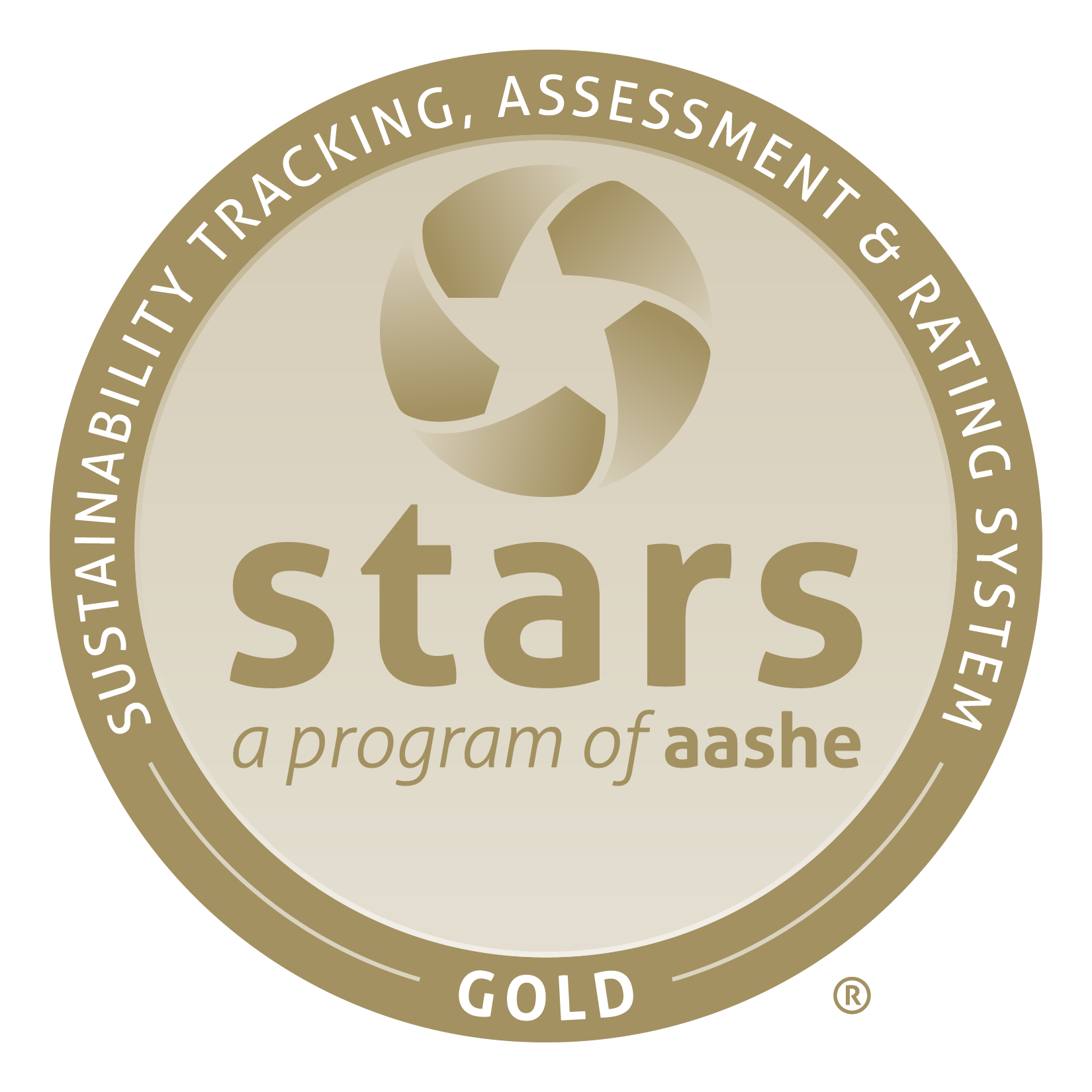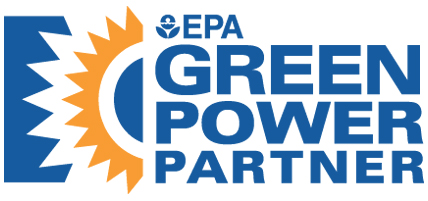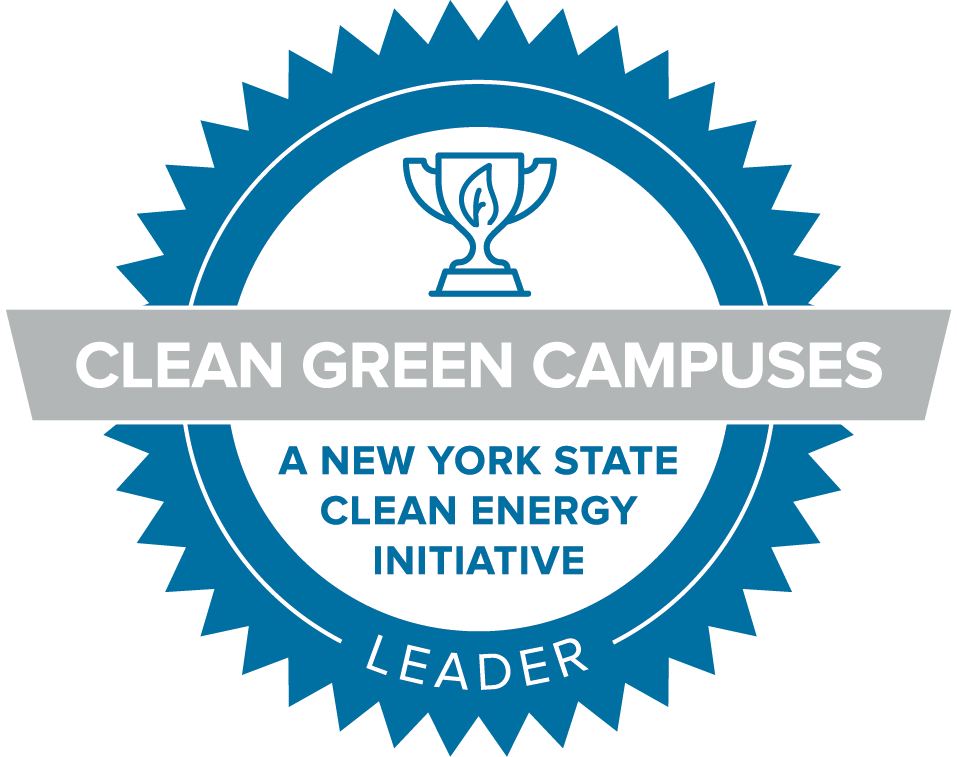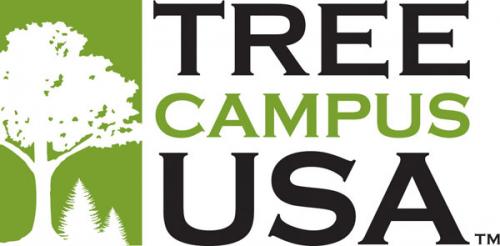Campus Policies
Sustainable Construction and Renovation Policy
Adopted March 5, 2021
Purpose
Skidmore will continue to invest in buildings and other infrastructure to meet our community’s needs and achieve our aspirations. However, we also acknowledge that campus growth may appear to be at odds with our commitment to sustainability. As we continue to develop campus and pursue projects that are critical to enhancing a high-quality college experience, we must do so in a way that mitigates the negative environmental, social, and economic impacts of constructing and operating new infrastructure.
The Sustainable Construction and Renovation Policy informs decisions regarding the design, construction, and operation of our future built environment. The policy specifies both required and discretionary guidelines. This flexibility allows Skidmore to make strategic, data-driven decisions that balance sustainable infrastructure investments with budgetary limitations. The standards and guidelines outlined will guarantee that future campus development aligns with our institutional values, including health and well-being, justice and equity, environmental stewardship, and fiduciary responsibility. By following this policy, Skidmore will expand our living lab infrastructure, serve as a model for responsible campus development, and become more resilient to the effects of climate change.
Applicability
Sections I+II of this policy apply to new construction and renovation projects over $2 million. Sections III+IV of this policy apply to all new construction and renovation projects.
Process
It is imperative to follow an integrated, collaborative, and transparent process to meet the requirements of this policy. For projects that are applicable under this policy, Facilities Services shall work in collaboration with the Campus Sustainability Subcommittee to review and discuss how the proposed project will meet the guidelines set forth in this policy.
Responsibility
All projects must meet the requirements outlined in this policy unless waived by the President of Skidmore College. This policy will be included in all Requests for Proposals to ensure project bids adhere to these guidelines.
All new construction over $5 million shall earn Leadership in Energy and Environmental Design (LEED) Silver certification or better, following the latest adopted LEED rating system. In addition to becoming LEED-certified, all new construction shall meet the guidelines and standards listed in section III, Policy for All Projects. Project teams should also investigate the feasibility of any applicable discretionary strategies outlined in section IV, Discretionary Strategies for All Construction and Renovation Projects.
All new construction projects under $5 million and renovation projects over $2 million shall be built to LEED Silver standards at a minimum but are not required to become LEED-certified. These projects will publicly report probable LEED points. These projects must address all relevant LEED Building Design + Construction prerequisites and shall meet the guidelines and standards listed in section III, Policy for All Projects. Project teams should also investigate the feasibility of applicable discretionary strategies outlined in section IV, Discretionary Strategies for All Construction and Renovation Projects.
All projects, regardless of scale, or that utilize or replace any of the materials or components listed below, shall adhere to the following standards and criteria:
Climate and Energy
- Utilize only LED lighting in all campus applications.
- Utilize occupancy sensors in all classrooms and offices.
- Conduct a 50-75 year life cycle analysis on major mechanical, electrical, and plumbing systems to determine potential impacts on energy use, repair costs, and greenhouse gas emissions.
Water Use
- Utilize only low-flow and WaterSense Labeled fixtures and appliances (see Appendix B: Low-Flow Standards).
Sustainable Sites
-
- Restore project site with native and adapted plant species approved in Campus Tree Care Plan.
Waste Reduction
- Projects shall divert at least 50% of all construction and demolition materials from landfills.
- Landfill and recycling containers in public and high-traffic areas will be clearly labeled, permanently attached (co-located), and will utilize restrictive lids. Preference should be given to containers that are adaptable to future changes in waste and recycling collection protocols.
- Landfill and recycling containers must be co-located in offices and classrooms.
- Container color requirements (lids only):
- Landfill: Black,
- Recycling: Blue,
- Compost: Green.
Inclusivity in Design
-
- All projects shall include all-gender restrooms.
- All projects shall meet all ADA requirements.
Material Use
-
- Permanent or semi-permanent appliances shall be Energy STAR certified or retain similar energy certification.
- At least 75% of interior paints and coatings, interior adhesives and sealants, flooring, composite wood, ceilings, walls, acoustic insulation, furniture, and exterior applied products shall meet LEED volatile organic compound (VOC) thresholds.
- At least 75% of all paints, adhesives, sealants, primers, floor coatings, wood finishes, carpets, carpet cushions, furniture seating, flooring, and wood/fiber products must meet the standards or certifications outlined in Appendix B: Low-Emitting Materials and Material Use Standards, or as specified in the latest LEED standards.
Skidmore should investigate the feasibility of additional investments that will support our sustainability commitments. Facilities and the Campus Sustainability Subcommittee will refer to the discretionary strategies listed below and determine which opportunities are worth pursuing. The decision to make additional investments will be guided by the project budget, payback period, and potential impact on the goals outlined in our 2015-2025 Campus Sustainability Plan, or any updated version.
Climate and Energy
- Investigate on-site renewable energy projects.
- Install building-level electrical and heating system meters that are network-connected and can be monitored through a centralized management system or online dashboard.
- Investigate low-impact (lower global warming potential) or natural refrigerants and utilize when possible.
- Identify approaches to improve the resiliency of campus buildings, including but not limited to disaster preparedness (natural and human-caused), climate change, and resilient/redundant/diverse building systems.
- Achieve heating efficiency recommendations outlined in Appendix B: Heating Efficiency Standards.
- Achieve electrical efficiency recommendations outlined in Appendix B: Electrical Efficiency Standards.
- Achieve space efficiency standards outlined in Appendix B: Space Efficiency Standards.
- Minimize heat island effect by investigating green roofs and other strategies.
- Investigate potential energy costs savings from strategic tree species selection and placement.
- Incorporate demand response capabilities in building infrastructure.
- Maximize use of natural daylight whenever possible.
- Provide short- and long-term bicycle storage.
Water Use
- Install a building-level water meter.
- Utilize xeriscape landscape design.
Sustainable Sites
- Investigate opportunities to maximize and restore open space within project boundary.
- Investigate opportunities to reduce impervious hardscapes.
Education
- Incorporate building designs that provide access or visibility to sustainable building infrastructure.
- Install permanent building signage that highlights sustainability features.
- Install a permanent energy dashboard in high-traffic areas.
Heating Efficiency Standards:
- Campus buildings shall achieve an average annual heating efficiency rate that aligns with LEED guidelines and contributes to our progress toward Energy Goal Four: 60% reduction in energy use for heating and cooling per student and square foot of the 2015-2025 Campus Sustainability Plan, or any updated version.
Electrical Efficiency Standards:
- Campus buildings shall achieve an average annual electrical efficiency rate that aligns with LEED guidelines and contributes to our progress toward Energy Goal Five: maintain electricity use per student and square foot of the 2015-2025 Campus Sustainability Plan, or any updated version.
Electrical efficiency should account for both process energy (computers, office equipment, washers/dryers, elevators, kitchen appliances, etc.) and non-process or regulated energy (HVAC, lighting, hot water heating, etc.).
Water Use Efficiency Standards:
- Toilet:28 gallons per flush (gpf) and dual-flush when possible.
- Urinal:125 gpf
- Public lavatory faucet:4 gallons per minute (gpm)
- Private lavatory faucet:5 gpm
- Kitchen faucet:75 gpm
- Showerhead: 2 gpm
- Residential clothes washer: Energy STAR or performance equivalent
- Commercial clothes washer: CEE Tier 3A
- Residential dishwasher: Energy STAR or performance equivalent
- Pre-rinse spray values: Less than 1.3 gpm
- Ice Machine: Energy STAR or performance equivalent and use air-cooled or closed-loop cooling
Low-Emitting Materials and Material Use Standards:
- Material Use Standards and certification requirements
- Adhesives, sealants, primers, floor coatings, wood finishes: South Coast Air Quality Management District Rule #1113
- Paints and coatings, anticorrosive and anti-rust paints, aerosol adhesives: Green Seal
- Carpets: Green Label (Carpet and Rug Institute)
- Carpet Cushions: Green Label Plus (Carpet and Rug Institute)
- Furniture and Seating: GREENGUARD
- Consider items that can be easily repaired rather than replaced, are durable and meet or exceed a useful 10-year lifespan, and can be responsibly discarded after their useful life at Skidmore by donating or recycling material.
- Flooring (vinyl, linoleum, wood, ceramic, laminate, rubber flooring): FloorScore
- Wood/fiber products: Utilize FSC-certified wood products and/or rapidly renewable fiber products
Space Efficiency Standards: Note: the following are baseline standards for offices and academic spaces. These can be expanded upon to create a larger space use standards policy if so desired.
- Office spaces: standard offices shall be less than or equal to 120 square feet/occupant.
- Academic spaces (classrooms, seminar rooms, teaching laboratories): 18-30 square feet/seat.
Research laboratories are exempt from this standard.
Purchasing Guidelines
Skidmore College believes our procurement decisions should match our institutional values and commitment to sustainability and responsible citizenship. We recognize that every purchase has an environmental and social impact, and we are committed to making procurement decisions that are environmentally and socially responsible and support a thriving local economy. Our commitment extends across product categories, including paper, IT/Electronics, Fleet Vehicles, and Cleaning Products.
Office Paper
All office printing paper will meet or exceed 30 percent post-consumer recycled content or will be Forest Stewardship Council MIX certified. Each office is responsible for adhering to this policy, and the College’s WB Mason account settings will direct users to products that meet these criteria.
Janitorial Paper Products
All janitorial paper products, including paper towels and bathroom tissue, will be made from 100 percent post-consumer recycled content or will be Forest Stewardship Council, Green Seal, or UL ECOLOGO certified.
Skidmore College will give preference to electronics or appliances that are Energy STAR certified or meet or exceed EPEAT Gold certification standards when economically feasible. Qualifying electronics include desktop and notebook/laptop computers, displays, thin clients, tablets/slates, televisions and imaging equipment (copiers, digital duplicators, facsimile machines, mailing machines, multifunction devices, printers and scanners).
Skidmore College will consider alternative-fueled vehicles when making all fleet vehicle purchases. Skidmore will give preference to hybrid or alternative-fueled vehicles when economically feasible. Alternative-fueled vehicles include:
- Gasoline-electric hybrid;
- Diesel-electric hybrid;
- Plug-in hybrid;
- 100 percent electric (including electric assist utility bicycles and tricycles);
- Fueled with Compressed Natural Gas (CNG);
- Hydrogen fueled;
- Fueled with B20 or higher biofuel for more than four months of the year; or
- Fueled with locally produced, low-level (e.g. B5) biofuel for more than four months of the year (e.g. fuel contains cooking oil recovered and recycled on campus or in the local community). (AASHE STARS 2.1, 2016)
Skidmore College gives preference to Green Seal or UL ECOLOGO certified cleaning products, providing that these products meet all required performance standards and are economically feasible.
ENERGY STAR
ENERGY STAR is a U.S. Environmental Protection Agency program that includes frameworks to certify energy efficient buildings and products, and Portfolio Manager, an online tool to benchmark the energy and water performance of buildings.
EPEAT
EPEAT is a certification for computers and other electronic products. The standard’s evaluation criteria include energy efficiency, reduction and elimination of environmentally sensitive materials, materials selection, design for end-of-life, product longevity and life cycle extension, end-of-life management, corporate performance, and packaging characteristics. EPEAT currently registers products in 41 countries and regions.
Forest Stewardship Council
The Forest Stewardship Council (FSC) is an independent, non-profit organization that protects forests for future generations. FSC Chain-of-Custody certification traces the path of products from forests through the supply chain, verifying that FSC-certified material is identified or kept separated from non-certified material throughout the chain. FSC Forest Management certification confirms that a specific area of forest is being managed in line with the FSC Principles and Criteria.
UL ECOLOGO
The UL Environment ECOLOGO program certifies products, services and packaging for reduced environmental impact. ECOLOGO Certifications are voluntary, multi-attribute, lifecycle based environmental certifications that meet the ISO 14024 standards for eco-labeling.
(AASHE STARS Technical Manual, 2016)



